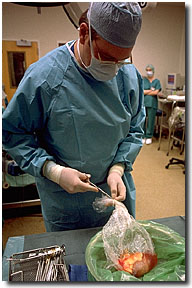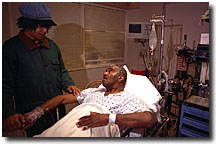 ach case is a poignant mix of tragedy and hope: A high-speed car wreck leaves a young passenger with irreparable head injuries. When the ambulance arrives at the trauma center in rural Virginia, the patient shows no brain activity. He had checked the donor box on his driver's license, and his family gives its consent to harvest his organs to save other lives. Now what?
ach case is a poignant mix of tragedy and hope: A high-speed car wreck leaves a young passenger with irreparable head injuries. When the ambulance arrives at the trauma center in rural Virginia, the patient shows no brain activity. He had checked the donor box on his driver's license, and his family gives its consent to harvest his organs to save other lives. Now what?In the recent past, the donor's body would be maintained on a ventilator while a coordinator at the hospital made urgent phone calls to transplant centers around the country. The donor's blood type, tissue type, medical history, and dozens of other factors would be conveyed by phone or fax, over and over again, until the right matches were found.
But one year ago, organ donation in Virginia went online in a pilot project called Xpedite, a computer system commissioned and sponsored by the Richmond, Virginia-based United Network for Organ Sharing (UNOS). Using the Xpedite system, a donor coordinator enters the essential data in a uniform format and simultaneously transmits crucial information from the donor's bedside via modem, fax, or pager to all potentially needy sites.
"The benefits of this system are flexibility and efficiency," says Joel Newman, spokesman for UNOS. "Sometimes we can save several hours in the placement process. It frees the coordinator to manage the donor, and can result in more organs being placed."








